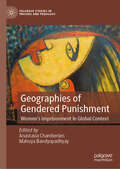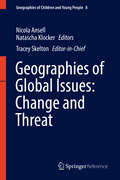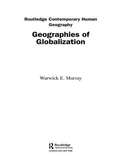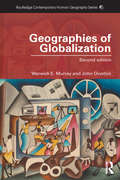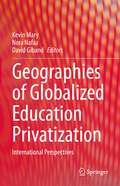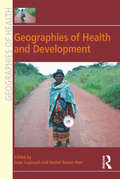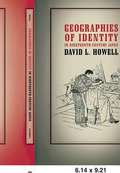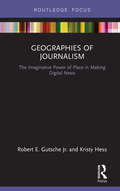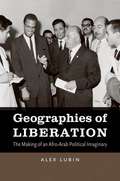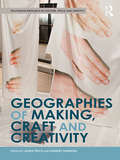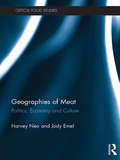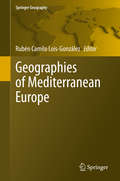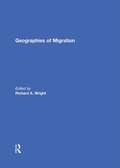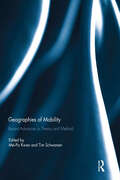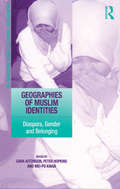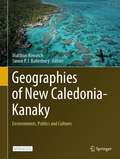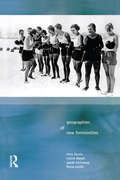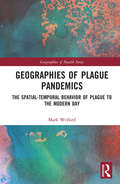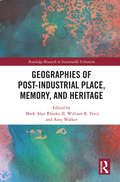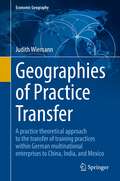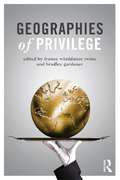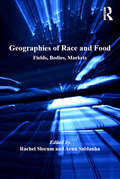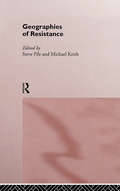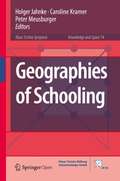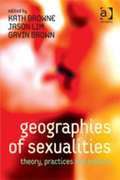- Table View
- List View
Geographies of Gendered Punishment: Women’s Imprisonment in Global Context (Palgrave Studies in Prisons and Penology)
by Anastasia Chamberlen Mahuya BandyopadhyayThis edited book explores new and enduring themes in the gendered experience of incarceration across the world. Capturing global debates and research on women’s treatment, their coping and resistances in penal settings, the collection promotes a feminist agenda that is attuned to the inherently patriarchal and intersectionally oppressive structures of contemporary punishment. It seeks to map policies and campaigns around women’s criminalisation across the world and offers one of the most comprehensive overviews of women’s imprisonment experiences across the Global North and Global South. Each chapter focusses on a different geographic context and theme and aims to provide the intellectual groundwork for a critical, world-wide movement advocating for women’s decarceration. As a whole, the collection offers a robust empirical understanding of women’s punishment in non-western, Global South contexts and also revisits ongoing debates in feminist accounts of punishment in the Global North. In doing so, the collection examines hierarchical geopolitical relations between privileged and underprivileged nations, reflecting global inequalities and structural violence rooted in legacies of imperialism and colonialism. Overall, the edited collection shows how centering women’s peripheralized experiences can radically reshape our understanding of punishment and offers a new intellectual, methodological, and political means through which to think about gendered identity and imprisonment in the 21st Century.
Geographies of Global Issues: Change and Threat
by Tracey Skelton Nicola Ansell Natascha KlockerVolume 8 explores children and young people’s lives at a time of rapid and profound change, through the lens of diverse global processes: economic globalisation, environmental degradation, international development, cultural change, climate change and environmental hazards. Today’s children and young people are growing up in a world that is rapidly changing and very different to that experienced by previous generations. Contemporary social, economic and environmental challenges make children and young people vulnerable and expose them to harm. Equally, they compel them to become instigators of change across geographical scales, from the household to the globe. Children and young people need to be adaptive and resourceful: economically, socially and emotionally. This volume is divided into two substantive sections. Chapters in the first section explore global economic changes and instabilities that are altering patterns of work, compelling children to take on new economic responsibilities and reshaping childcare arrangements. Several chapters address the ways in which global processes shape young people’s subjectivities, with media, internet and education encouraging children and youth to view themselves as both entrepreneurs and global citizens. Other chapters consider the policies and development interventions implemented by global organisations and national governments. These can have unintended consequences because they are rooted in a normative discourse of a ‘global child’ that bears little relation to lived realities. Chapters in the second section foreground children and young people’s contributions to environmental issues and debates. Children and young people are affected by environmental change: by pollution, environmental hazards and climate change. They suffer displacement, ill-health and anxiety about the future. They are also intimately attached to – and knowledgeable about – their local environments. Children and young people actively shape their environments, yet their lives remain powerfully influenced by today’s decision-makers. The window of opportunity to avoid catastrophic climate change is small. Evidence of children and young people’s environmental knowledge and activism does not obviate the need for adults to take decisive action, now, to ensure a viable environment for future generations.
Geographies of Globalization
by Warwick E. MurrayThis informative text offers a geographical perspective on globalization. It provides a lively exploration of its spatial impacts and the distinctive contribution of human geography to studies and debates in this field. Fully up-to-date and engaging, this work: critically appraises the concept and processes of globalization from a geographical perspective debates the historical evolution of globalized society illustrates how the core principles of human geography - such as space and scale - lead to a better understanding of the phenomenon analyzes the interconnected economic, political and cultural geographies of globalization examines the impact of global transformations 'on the ground' using examples from six continents discusses the challenges for the environment and the Third World created by globalizing processes articulates a human geographical framework for progressive globalization. Throughout, boxed sections highlight and clearly explain 'key concepts' and showcase classic and innovative work. Highly illustrated with figures, photographs and maps, this book also includes chapter summaries and annotated further reading. It will be indispensable for human geography, sociology, political science and development studies undergraduates and postgraduates studying the phenomenon on both dedicated and linked courses.
Geographies of Globalization (Routledge Contemporary Human Geography Series)
by Warwick E. Murray John OvertonGeographies of Globalization 2nd edition offers an animated and fully-updated exposition of the geographical impacts of globalization and the contribution of human geography to studies and debates in this area. Energetic and engaging, this book: * Illustrates how the core principles of human geography - such as space and scale - lead to a better understanding of the phenomenon * Debates the historical evolution of globalized society * Analyses the interconnected economic, political and cultural geographies of globalization * Examines the impact of global transformations 'on the ground' using examples from six continents * Discusses the three global crises currently facing the world - inequality, the environment and unstable capitalism most recently manifested in the Great Recession * Articulates a human geographical framework for progressive globalization and approaching solutions to the problems we face Boxed sections highlight key concepts and innovative work by geographers as well as topical and lively debates concerning current global trends. The book is also generously illustrated with a wide range of Figures, photographs, and maps.
Geographies of Globalized Education Privatization: International Perspectives
by Kevin Mary Nora Nafaa David GibandThis book explores the complex and various forms that privatization of education takes on a global scale at different ages of schooling. Through the spread of neoliberal policies in education both in the global North and the global South, the book suggests that this process is leading to new forms of schooling and socio-spatial dynamics linked to the creation of increasingly competitive school markets. The book highlights some of the main issues that such competition generates by focusing on the acceleration of the segregative processes on one hand but also on the alternatives that are emerging regarding this global context on the other hand. It considers processes of domination, hegemony, but also exclusion and segregation, eventually exploring contradictions inherent to societies. It presents innovative empirical and conceptual research by international scholars from the fields of social geography, sociology, history and demography in the United States, Lebanon, France, Afghanistan and Chile, thereby transcending disciplinary boundaries. Developed in under or unexplored contexts, the book broadens the reflection to social representations, individual and collective strategies, adaptation, innovation and also resistances.
Geographies of Health and Development (Geographies of Health Series)
by Rachel Bezner Kerr Isaac LuginaahThe geographies of health and development is an emerging sub-discipline, tying in with many of the conceptual, theoretical and practical components of other disciplines working in health, health care, economics, and international development. Spatially and theoretically grounded in geography, this collection offers a fresh perspective on the dialectic relationships between health and development. Health problems in a developing context take on much higher rates of prevalence as a result of the varied cultural, structural and economic vulnerabilities of the people they impact. This book begins by exploring some of the circumstances surrounding the distinctive health inequities currently facing many developing countries, including malaria, maternal mortality and HIV/AIDS. This is followed by a discussion of how matters of physical access and human resource issues and, perhaps most importantly, the challenges of financing, together shape the access and utilization of health care. Examining how the environment interacts to influence the health of the people that live there, the next section includes discussion around challenges of food (in)security, and the importance of clean and uncontaminated water for health. Finally, the book explores the influence of globalization on health, specifically within the urban environment, against the backdrop of global health policy.
Geographies of Identity in Nineteenth-Century Japan
by David L. HowellDavid L. Howell looks beneath the surface structures of the Japanese state to reveal the mechanism by which markers of polity, status, and civilization came together over the divide of the Meiji Restoration of 1868. The author exposes the many levels of anxiety inherent in the Meiji state's redefinition of status.
Geographies of Journalism: The Imaginative Power of Place in Making Digital News (Disruptions)
by Kristy Hess Robert E. Gutsche Jr.Geographies of Journalism connects theoretical and practical discussions of the role of geotechnologies, social media, and boots-on-the-ground journalism in a digital age to underline the complications and challenges that place-making in the press brings to institutions and ideologies. By introducing and applying approaches to geography, cultural resistance, and power as it relates to discussions of space and place, this book takes a critical look at how online news media shapes perceptions of locales. Through verisimilitude, storytelling methods, and journalistic evidence shaped by sources and news processes, the press play a critical role in how audiences shape interpretations of social conditions "here" and "there", and place responsibility for socio-political issues that appear in everyday life. Issues of proximity, place, territory, news myth, placemaking, and power align in this book of innovative and new assessments of journalism in the digital age. This is a valuable resource for scholars across the fields of human geography, journalism, and mass media.
Geographies of Liberation
by Alex LubinIn this absorbing transnational history, Alex Lubin reveals the vital connections between African American political thought and the people and nations of the Middle East. Spanning the 1850s through the present, and set against a backdrop of major political and cultural shifts around the world, the book demonstrates how international geopolitics, including the ascendance of liberal internationalism, established the conditions within which blacks imagined their freedom and, conversely, the ways in which various Middle Eastern groups have understood and used the African American freedom struggle to shape their own political movements. Lubin extends the framework of the black freedom struggle beyond the familiar geographies of the Atlantic world and sheds new light on the linked political, social, and intellectual imaginings of African Americans, Palestinians, Arabs, and Israeli Jews. This history of intellectual exchange, Lubin argues, has forged political connections that extend beyond national and racial boundaries.
Geographies of Making, Craft and Creativity (Routledge Research in Culture, Space and Identity)
by Harriet Hawkins Laura PriceThis book brings together cutting-edge research from leading international scholars to explore the geographies of making and craft. It traces the geographies of making practices from the body, to the workshop and studio, to the wider socio-cultural, economic, political, institutional and historical contexts. In doing so it considers how these geographies of making are in and of themselves part of the making of geographies. As such, contributions examine how making bodies and their intersections with matter come to shape subjects, create communities, evolve knowledge and make worlds. This book offers a forum to consider future directions for the field of geographies of making, craft and creativity. It will be of great interest to creative and cultural geographers, as well as those studying the arts, culture and sociology.
Geographies of Meat: Politics, Economy and Culture (Critical Food Studies)
by Harvey Neo Jody EmelWith the ever rising demand for meat around the world, the production of meat has changed dramatically in the past few decades. What has brought about the increasing popularity and attendant normalization of factory farms across many parts of the world? What are some of the ways to resist such broad convergences in meat production and how successful are they? This book locates the answers to these questions at the intersection between the culture, science and political economy of meat production and consumption. It details how and why techniques of production have spread across the world, albeit in a spatially uneven way. It argues that the modern meat production and consumption sphere is the outcome of a complex matrix of cultural politics, economics and technological faith. Drawing from examples across the world (including America, Europe and Asia), the tensions and repercussions of meat production and consumption are also analyzed. From a geographical perspective, food animals have been given considerably less attention compared to wild animals or pets. This book, framed conceptually by critical animal studies, governmentality and commodification, is a theoretically driven and empirically rich study that advances the study of food animals in geography as well as in the wider social sciences.
Geographies of Mediterranean Europe (Springer Geography)
by Rubén Camilo Lois-GonzálezThis edited volume highlights the geographies of six European Mediterranean countries: France, Spain, Italy, Portugal, Turkey and Greece. The book provides a balanced overview on what the geographers of these six countries have investigated and reflected in recent decades. This thematically arranged book takes into account the national differences of the authors, but also highlights the main contributions of Mediterranean geographies on a global scale. It reinforces a perception of common problems and debates in Southern Europe. This book appeals to the institutionalized geographical community of Mediterranean countries but also to a global audience of scholars of geography, territorial and spatial studies, social sciences and history.
Geographies of Migration
by Richard A. WrightMigration is an enormously broad topic of academic enquiry engaging researchers from many different social science disciplines. A wide variety of contributors from across the globe capture some of the methodological and conceptual range of migration research in the discipline of Geography today. This volume covers a large area geographically and in the expanse of subject areas involved: eighteen chapters investigate migration from, to, or within at least fifteen countries, with several sections spanning multiple places and scales. Many chapters are deeply concerned with vulnerable populations, which is not only a characteristic of much immigration scholarship but also one that connects with other areas of geography. The study of geographical assertions of sovereign power via the discourses of disorder, chaos, and crisis, shows that in these transnational times, national power is being violently reasserted, on, within, and beyond international borders. Other important topics covered include migration and climate change, "illegality", security, government policy, labor, family, and sexual orientation. This book was previously published as a special issue of Annals of the Association of American Geographers.
Geographies of Mobility: Recent Advances in Theory and Method
by Mei-Po Kwan Tim SchwanenThis book seeks to bring together different philosophical, theoretical, and methodological approaches to the study of human mobility within the discipline of geography. With five thematic sections – conceptualizing and analyzing mobility, inequalities of mobility, politics of mobility, decentering mobility, and qualifying abstraction – and 27 substantive chapters by leading researchers in the field, it provides a comprehensive overview of the latest thinking about human mobility and related issues. The contributors discuss mobility issues as diverse as everyday mobilities of young people, migrants and refugees, and sex workers; the relationships between citizenship and mobility; and the potential and pitfalls of big data for understanding mobility. This, coupled with a broad international focus, means that Geographies of Mobility will not only encourage and enrich dialogue on a theme that is of major importance to varied geographic research communities, but will also be of great interest to students and researchers across the wider social sciences. This book was originally published as a special issue of Annals of the American Association of Geographers.
Geographies of Muslim Identities: Diaspora, Gender and Belonging (Re-materialising Cultural Geography Ser.)
by Peter HopkinsIn recent years, geographies of identities, including those of ethnicity, religion, 'race' and gender, have formed an increasing focus of contemporary human geography. The events of September 11th, 2001 particularly illustrated the ways in which identities can be transformed across time and space by both global and local events of a social, cultural, political and economic nature. Such transformations have also demonstrated the temporal and spatial construction of hate and fear, and of increasing incidences of 'Islamophobia' through the construction of Muslims as 'the Other'. As the social scientific study of religion continues to be marginalized within mainstream scholarship, there remains an important gap in the literature. This timely book addresses this gap by collecting a range of cutting-edge contributions from the social, cultural, political, historical and economic sub-disciplines of geography, together with writings from gender studies, cultural studies and leisure studies where research has revealed a strong spatial dimension to the construction, representation, contestation and reworking of Muslim identities. The contributors illustrate the ways in which such identities are constructed, represented, negotiated and contested in everyday life in a wide variety of international contexts, focusing upon issues connected with diaspora, gender and belonging.
Geographies of New Caledonia-Kanaky: Environments, Politics and Cultures
by Matthias Kowasch Simon P. J. BatterburyThis open access book provides a unique overview of geographical, historical, political and environmental issues facing the French overseas territory New Caledonia, also called “Kanaky” by the indigenous Kanak people, who outnumber citizens of European and other origin. New Caledonia has seen a long and complex struggle for decolonization, but is still on the United Nations’ list of “Non-Self Governing territories” and there is little sign of change following three referendums on independence and extensive negotiations with France. The archipelago possesses around a quarter of the world’s nickel deposits, giving it additional strategic importance when demand for the mineral is strong. The islands have unique biodiversity, and Caledonian coastal lagoons have been listed as UNESCO world heritage sites since 2008. The book offers detailed insights into the environmental and human geographies of the archipelago, with a focus on the linksbetween environmental protection and extensive mining operations, between political independence struggles and continued wellbeing and economic development, and the differing visions for the future of the islands. This multidisciplinary volume, one of the few to appear in English, appeals to researchers, students and policy makers across the environmental, social and political sciences.
Geographies of New Femininities
by Sarah L. Holloway Nina Laurie Fiona Smith Claire DywerGeographies of New Femininities examines the emergence of contemporary constructions of femininity in a global context. It asks whether these femininities are new and suggests that current celebrations of diversity in the lived experience and performance of women's identities are largely Euro-centric.Through four in-depth case studies Geographies of New Femininities illustrates how constructions of femininities across the world reflect gender inequalities embedded within global/local geographies of social and economic change. The analysis brings together key themes in geography and feminist studies, showing how globalisation and the fracturing of identities are influencing research on gender.Throughout the book the authors explore spaces of opportunity and oppression for women and highlight the geographies associated with the negotiation of gender identities. Geographies of New Femininities moves between empirical and theoretical debate using first hand accounts to work through methodological issues relating to gender and geography. It is deliberately written in an accessible style to encourage students to engage with up-to-date research on gender.
Geographies of Plague Pandemics: The Spatial-Temporal Behavior of Plague to the Modern Day (Geographies of Health Series)
by Mark WelfordGeographies of Plague Pandemics synthesizes our current understanding of the spatial and temporal dynamics of plague, Yersinia pestis. The environmental, political, economic, and social impacts of the plague from Ancient Greece to the modern day are examined. Chapters explore the identity of plague DNA, its human mortality, and the source of ancient and modern plagues. This book also discusses the role plague has played in shifting power from Mediterranean Europe to north-western Europe during the 500 years that plague has raged across the continent. The book demonstrates how recent colonial structures influenced the spread and mortality of plague while changing colonial histories. In addition, this book provides critical insight into how plague has shaped modern medicine, public health, and disease monitoring, and what role, if any, it might play as a terror weapon. The scope and breadth of Geographies of Plague Pandemics offers geographers, historians, biologists, and public health educators the opportunity to explore the deep connections among disease and human existence.
Geographies of Post-Industrial Place, Memory, and Heritage (Routledge Research in Sustainable Urbanism)
by Amy Walker Mark Alan Rhodes II William R. PriceAll industrialization is deeply rooted within the specific geographies in which it took place, and echoes of previous industrialization continue to reverberate in these places through to the modern day. This book investigates the overlap of memory and the impacts of industrialization within today’s communities and the senses of place and heritage that grew alongside and in reaction to the growth of mines, mills, and factories. The economic and social change that accompanied the unchecked accumulation of wealth and exploitation of labor as the industrial revolution spread throughout the world has numerous lasting impacts on the socioeconomics of today. Likewise, the planet itself is now reeling. The memory and heritage of these processes reach into the communities that owe the industrial revolution their existence, but these populations also often suffered adverse impacts to their health and environment through the large-scale and rapid extraction of natural resources and production of goods. Through the themes of memory, community, and place; working post-industrial landscapes; and the de-romanticization of industrial pasts, this book examines the endurance and decline of these communities, the spatial processes of industrial byproducts, and the memory and heritage of industrialization and its legacies. While based in the traditions of geography, this collection also draws upon and will be of great interest to students and scholars of cultural anthropology, archaeology, sociology, history, architecture, civil engineering, and heritage, memory, museum, and tourism studies. Using global examples, the authors provide a uniquely geographic understanding to industrial heritage across the spaces, places, and memories of industrial development.
Geographies of Practice Transfer: A practice theoretical approach to the transfer of training practices within German multinational enterprises to China, India, and Mexico (Economic Geography)
by Judith WiemannEmploying a practice theoretical approach, this study centers on how German multinational enterprises transfer three selected production-related training practices to their subsidiaries in emerging economies: onboarding of new employees, shop floor inducting of machine operators, and German-style dual apprenticeship training for specialized technicians. Empirical findings are drawn from three research regions: Greater Shanghai Area (China), Metropolitan Areas Mumbai-Pune-Bangalore (India), and Central Mexico (Mexico).In doing so, this study contributes to debates about the internationalization of multinational enterprises conceptualizing internationalization through the lens of practice transfer. Practice transfer is still an understudied phenomenon in economic geography while international business studies have a long-standing research interest in this area. This study provides a bridge between these two disciplinary fields connecting debates in economic geography on proximity/distance and knowledge transfer with organization studies-based research in international business studies – all the while providing a unique new perspective by developing a practice theoretical approach to explain practice transfer across distance and between territories.
Geographies of Privilege
by France Winddance Twine Bradley GardenerHow are social inequalities experienced, reproduced and challenged in local, global and transnational spaces? What role does the control of space play in distribution of crucial resources and forms of capital (housing, education, pleasure, leisure, social relationships)? The case studies in Geographies of Privilege demonstrate how power operates and is activated within local, national, and global networks. Twine and Gardener have put together a collection that analyzes how the centrality of spaces (domestic, institutional, leisure, educational) are central to the production, maintenance and transformation of inequalities. The collected readings show how power--in the form of economic, social, symbolic, and cultural capital--is employed and experienced. The volume’s contributors take the reader to diverse sites, including brothels, blues clubs, dance clubs, elite schools, detention centers, advocacy organizations, and public sidewalks in Canada, Italy, Spain, United Arab Emirates, Mozambique, South Africa, and the United States. Geographies of Privilege is the perfect teaching tool for courses on social problems, race, class and gender in Geography, Sociology and Anthropology.
Geographies of Race and Food: Fields, Bodies, Markets (Critical Food Studies)
by Arun Saldanha Rachel SlocumWhile interest in the relations of power and identity in food explodes, a hesitancy remains about calling these racial. What difference does race make in the fields where food is grown, the places it is sold and the manner in which it is eaten? How do we understand farming and provisioning, tasting and picking, eating and being eaten, hunger and gardening better by paying attention to race? This collection argues there is an unacknowledged racial dimension to the production and consumption of food under globalization. Building on case studies from across the world, it advances the conceptualization of race by emphasizing embodiment, circulation and materiality, while adding to food advocacy an antiracist perspective it often lacks. Within the three socio-physical spatialities of food - fields, bodies and markets - the collection reveals how race and food are intricately linked. An international and multidisciplinary team of scholars complements each other to shed light on how human groups become entrenched in myriad hierarchies through food, at scales from the dining room and market stall to the slave trade and empire. Following foodways as they constitute racial formations in often surprising ways, the chapters achieve a novel approach to the process of race as one that cannot be reduced to biology, culture or capitalism.
Geographies of Resistance
by Steve Pile Michael KeithUntil very recently questions of resistance seemed straightforward, addressed in terms of an analysis of power. This book demonstrates how new, radical geographies of resistance emerge, develop and operate. Radical cultural politics, exemplified by the black, feminist and gay liberation, has developed struggles to turn sites of oppression and discrimination into spaces of resistance. Post-colonial and queer theory have opened up new political spaces. Whether resistance is an act of transgression (crossing borders), opposition (such as constructing barricades), or everyday endurance (staying in place), these are geographies where space is constitutive of the social. Leading contemporary geographers draw on material from around the world, including Israel, Nepal, Canada, Philippines, Australia and Nigeria. Recasting current themes in critical human geography - politics, identity and place - the contributors introduce unexplored notions of resistance, offering exciting insights for those exploring social, cultural, urban, political and development issues in different worlds of change.
Geographies of Schooling (Knowledge and Space #14)
by Peter Meusburger Holger Jahnke Caroline KramerThis open access book explores the complex relationship between schooling as a set of practices embedded in educational institutions and their specific spatial dimensions from different disciplinary perspectives. It presents innovative empirical and conceptual research by international scholars from the fields of social geography, pedagogy, educational and social sciences in Germany, the United Kingdom, France, Czechia, Hungary, Austria, Switzerland, Norway and Canada. The book covers a broad range of topics, all examined from a spatial perspective: the governance of schooling, the transition processes of and within national school systems, the question of small schools in peripheral areas as well as the embeddedness of schooling in broader processes of social change. Transcending disciplinary boundaries, the book offers deep insights into current theoretical debates and empirical case studies within the broad research field encompassing the complex relationship between education and space.
Geographies of Sexualities: Theory, Practices and Politics
by Jason Lim Kath BrowneRecent years have seen a dramatic upsurge of interest in the connections between sexualities, space and place. Drawing established and 'founding' figures of the field together with emerging authors, this innovative volume offers a broad, interdisciplinary and international overview of the geographies of sexualities. Incorporating a discussion of queer geographies, Geographies of Sexualities engages with cutting edge agendas and challenges the orthodoxies within geography regarding spatialities and sexualities. It contains original and previously unpublished material that spans the often separated areas of theory, practices and politics. This innovative volume offers a trans-disciplinary engagement with the spatialities of sexualities, intersecting discussions of sexualities with issues such as development, race, gender and other forms of social difference.
